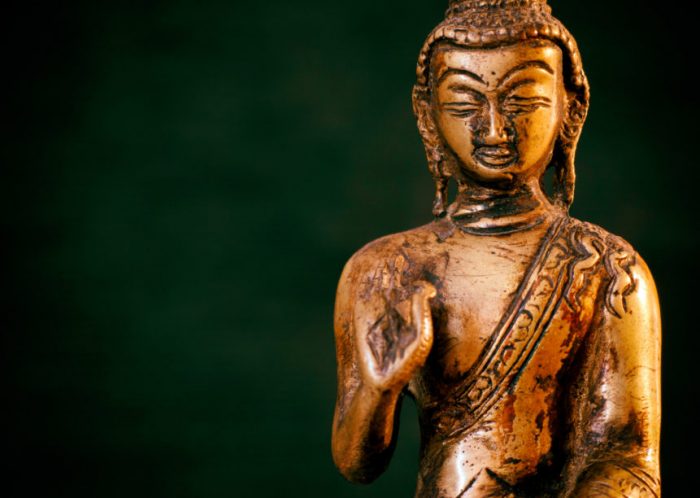“Prisoners chained in a cave, facing the wall, unable to turn their head while behind them a fire burns. Between the fire and the prisoners is a parapet, along which puppeteers can walk, holding up puppets that cast shadows on the wall of the cave. Unable to see the puppets as real objects they mistake their shadows as to be real. Not knowing of the real cause of the shadows they remain in bondage of their own ignorance.”
Although this reads as an introduction to a fiction script it is actually Plato’s famous allegory of the cave that appeared in his masterwork The Republic sometime between 380 and 360 B.C. Even though the allegory contains many forms of symbolism and is therefore also open to various interpretations it essentially instructs the listener in the nature of perception.
Little did I know that, by encountering Plato’s description of a distorted perception of reality at a young age, I got in touch with one of the most central themes of Buddhist contemplative insight: the understanding of fundamental reality. Something that Galileo and Darwin insisted to examine empirically and therefore challenged the ideological constraints of religious dogmas.
What can we know about reality and more so about ourselves? Who or what gives rise to all experiences?
Who is this ‘I’ we call ‘self’ that suffers?
It is said that the Buddha gave 84,000 different teachings, in response to various types of human conditioning, that came through his own observation of mind rather than through a particular belief system or theoretical framework.
While those teachings cover topics stretching from understanding lasting happiness and instructions on settling the mind in its natural state to the origin of species, they all come down to realizing the underlying reality of how things are, rather than as they appear based on our habitual thought patterns – our conditioned mind. Understanding the underlying reality penetrates our self-image and turns the perception of a self, that we call ‘I’ upside down, while the actual nature of our own existence gradually shines forth.
Insights that I have been deeply longing for while feeling a condensed experience of being-ness experienced in my childhood. Throughout these early years narcissistic wounding (when one or both parents tried to meet their needs through us and didn’t fully respond to our needs), social manipulation, herd mentality, collective confusion and first and foremost my own lack of insight shaped a distorted self image — an identity that anchored a deeply confused idea of my own nature of existence.
As the contemporary spiritual teacher Adyashanti describes it in simple language: “You view what the mind is conditioned to view.
While at first glance it might seem that it was suffering of my own experience of humanness that was the catalyst to explore my own existence beyond the psychological process occurring in the mind, it was actually an instinct to seek freedom, not necessarily freedom from, but more so freedom to. Determined to experience inner freedom in its absolute expression I embarked on my ‘Heroine’s Journey’ (in the language of Joseph Campbell) of investigating the dimensions of reality and the source of emergent appearances and functions by turning attention to mind itself, while diving deeper into Buddhist ideas and meditative practices.
In my pursuit of truth and meaning I began to explore the question:
What leads to an obstructed view of reality and where lies the underlying freedom of experiencing?
From a Buddhist perspective all phenomena come into form through what is called Dependent Origination, which means that nothing exists on its own; everything is dependent on earlier circumstances and/or ‘other’ phenomenon.
Conventional perception seems to point to Independent Origination of forms of all kinds, be it thoughts, emotions, feelings or outer appearances.
Contrary to Buddhist ideas that are ultimately based on Dependent Origination the former leads to a dualistic perception of the world and ourselves in which the sense of a separate self and ‘a world out there’ appears, in opposition to the Buddhist idea of Independent Origination, that no separateness in the ultimate sense can be found. These misconceptions of Independent Origination and a separate self are aspects of one’s so-called ignorance and eventually result in an altered perception of the world and ourselves. In this context it is important to mention that ignorance in Buddhist terminology is not understood as being uneducated, or stupid, but rather as the inability to see how reality is composed and how things are. According to Buddhism the failure to see clearly gives rise to aversion and attachment, which are the two essential causes of suffering on top of the third, ignorance itself.
In other words, we reject what could cause pain (aversion), we grasp onto pleasure (attachment), based on a deep misunderstanding about the nature of reality.
In short one can say as mind is fragmented it can only perceive in terms of its ratio to pleasure and pain, suffers from impermanence of appearances and identifies with a self-designed separate entity of self, consequently resulting in an altered perception of ‘I’, ‘me’ and ‘mine’ that leads to an obstructed view of reality.
As the famous English poet William Blake put it: “If the doors of perception were cleansed every thing would appear to man as it is, Infinite. For man has closed himself up, till he sees all things thro’ narrow chinks of his cavern“.
For many people the raw experience of suffering is the first and strongest impulse of first-person insight into the nature of mind.
In my own life I had to strip off the layers of my own narrative, unraveling my assumptions about my identity and the world until there were no longer any concepts I could use as a frame of reference. A painful experience for the ego that is addicted to feeding on one’s own image of identity.
Becoming naked in the ultimate sense of the meaning and laying bare the mind by grinding down all concepts about the world and the self, is a continuous process of gaining insight into fundamental aspects of reality and thereby dispelling suffering’s fundamental cause — ignorance, as described earlier.
Buddhism is after all, not a theoretical framework of understanding the ultimate nature of reality, nor a collected dust of traditions, rules to live-by, but rather it is a gateway of first-person insight into the nature of existence. It is an instinctive and, for most of us, revolutionary waking up to how things are.







Read 0 comments and reply